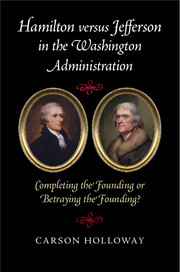 Hamilton versus Jefferson in the Washington Administration
Hamilton versus Jefferson in the Washington Administration Book contents
- Frontmatter
- Dedication
- Contents
- Acknowledgments
- 1 Introduction
- PART I A DEBATE BETWEEN CABINET COLLEAGUES
- PART II A CLASH OF RIVAL PARTY LEADERS
- PART III Founding Foreign Policy
- 11 Two Views of the French Revolution
- 12 Faith among Nations I: Jefferson's Opinion on the French Treaties
- 13 Faith among Nations II: Hamilton's Opinion on the French Treaties
- 14 The Constitutional and Political Theory of Hamilton's Pacificus Papers
- 15 Jefferson, Madison, and Helvidius' Critique of Pacificus
- 16 Conclusion
- Index
15 - Jefferson, Madison, and Helvidius' Critique of Pacificus
from PART III - Founding Foreign Policy
Published online by Cambridge University Press: 05 November 2015
- Frontmatter
- Dedication
- Contents
- Acknowledgments
- 1 Introduction
- PART I A DEBATE BETWEEN CABINET COLLEAGUES
- PART II A CLASH OF RIVAL PARTY LEADERS
- PART III Founding Foreign Policy
- 11 Two Views of the French Revolution
- 12 Faith among Nations I: Jefferson's Opinion on the French Treaties
- 13 Faith among Nations II: Hamilton's Opinion on the French Treaties
- 14 The Constitutional and Political Theory of Hamilton's Pacificus Papers
- 15 Jefferson, Madison, and Helvidius' Critique of Pacificus
- 16 Conclusion
- Index
Summary
Hamilton's turn as Pacificus provoked a spirited rejoinder in the form of five essays published under the name of Helvidius. Today, the Pacificus-Helvidius exchange is still taken as one of the great debates of the founding era and certainly as the great post-ratification debate over the scope of the executive power, especially in relation to foreign policy. A study of Hamilton's account of these issues in his Pacificus series is, it would seem, incomplete without an examination of Helvidius’ response.
Here, however, we encounter an apparent problem. James Madison, not Thomas Jefferson, penned the Helvidius essays. How, then, does an examination of Helvidius’ arguments fit into a study of the debates between Hamilton and Jefferson? This difficulty is more apparent than real, for while Jefferson did not write the Helvidius essays, he was certainly involved in their production. Moreover, it is fair to say that they represent, at least in an approximate way, his own view of the issues at stake.
Jefferson did not write the Helvidius essays, but he induced Madison to write them. After the first Pacificus paper appeared, Jefferson wrote to Madison calling it to his attention and expressing his concern that Hamilton's “heresies…should pass unnoticed and unanswered”– or at least that they would get no adequate answer. “For,” as he observed to Madison, “none but mere bunglers and brawlers have for some time taken the trouble to answer any thing.”
Needless to say, Jefferson did not regard Madison as a mere bungler or brawler. It is therefore not surprising that he shortly struck upon the idea that Madison himself was the very man to take up the task of refuting Hamilton's Pacificus. Thus, after the second and third Pacificus essays appeared, Jefferson wrote to Madison with greater urgency, famously imploring him: “For god's sake, my dear sir, take up your pen, select the most striking heresies, and cut him to pieces in the face of the public. There is nobody else who can and will enter the lists with him.” Madison reluctantly agreed.
Jefferson did more than just plant the seed of the Helvidius papers in Madison's mind. He consulted with his fellow Virginian on the project from beginning to end.
- Type
- Chapter
- Information
- Hamilton versus Jefferson in the Washington AdministrationCompleting the Founding or Betraying the Founding?, pp. 288 - 323Publisher: Cambridge University PressPrint publication year: 2015


